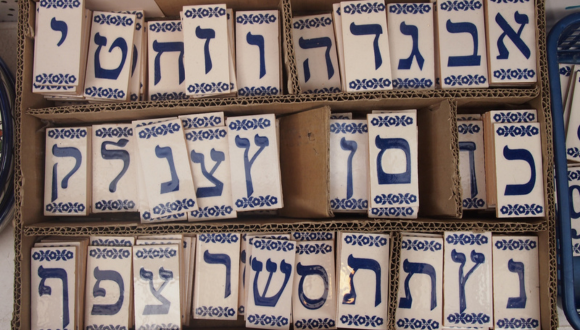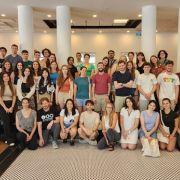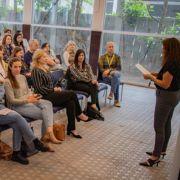Understanding Hebrew: Is It a Difficult Language to Learn?
Unlocking the beauty of Hebrew: Insights from Tel Aviv University's top language program
Intensive Summer Ulpan: July, August, September
Semester Hebrew: Fall & Spring
All levels
Tel Aviv University Hebrew courses are among the best in Israel, offering a range of intensive one-month programs in summer and winter and semester-long options at various levels.
As Hanna Rashin, who is in charge of coordinating the Hebrew Ulpan program in Tel Aviv, explains, international students are highly motivated to learn Hebrew while in Israel because it allows them to better understand Israeli culture and lifestyle and engage with people.
“Students are ready to invest their time in language studies to get a career advantage and take the most of their Israeli experience.”—Hanna Rashin
Notably, many international students without Jewish roots are eager to study Hebrew in Israel and learn more about the culture. Several major Chinese universities now offer Hebrew as a foreign language due to the growing demand for the language in China. Some students even go on to major in Jewish studies because they want to study Tanach. There is also a lot of interest in India, where a Hebrew language course is seen as a career advancement opportunity.
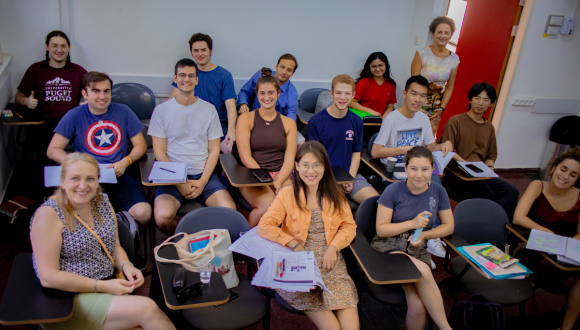
Hebrew course at Tel Aviv University, Israel
The Hebrew curriculum at TAU is intense, covering grammar, reading, listening comprehension, essays, and presentations. By the end of the course, students have a working knowledge of the language. Centered around academic Hebrew, the program allows students to focus on their academic subjects and present topics related to their research. For instance, a biology student might describe turtle behavior, while a music major might discuss a composer or performer.
Hebrew Unveiled
Learning Hebrew, a unique language with ancient roots and a modern revival, can be a rewarding but sometimes challenging journey. Hebrew is a Semitic language, built around three- (or four-) letter roots that form the basis of words. This root system, while fascinating, can be perplexing for beginners who are not used to such linguistic constructs.
Knowing one root, you can deduce the meaning of related words and build new words yourself—nouns from verbs, for example.
Another hurdle is mastering the pronunciation and spelling. Hebrew uses a different alphabet, and many words contain similar sounds but different letters, making spelling tricky. Additionally, Hebrew is mostly a consonantal language, and without the Niqqud (vowel points), it can be challenging to determine the correct pronunciation of unfamiliar words. The word stress also varies and can change the meaning of words, which adds another layer of complexity.
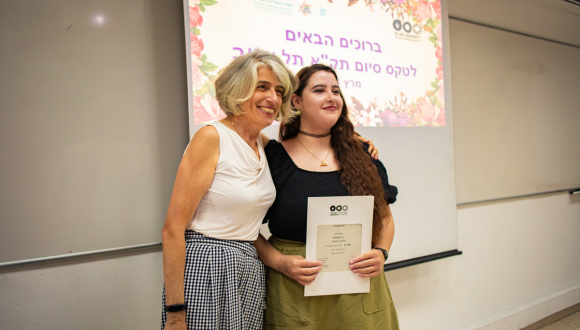
TAKA Academic Hebrew graduation ceremony
The specific difficulties depend on the features of the students’ native language. Gendered verbs and adjectives may present an obstacle for speakers of languages that do not differentiate between masculine and feminine forms—such as English, for instance. For speakers of Russian, the definite article proves to be most problematic.
“Hebrew is often very different from students’ languages, but when students understand the core principles, they start seeing its beauty.”—Hanna Rashin
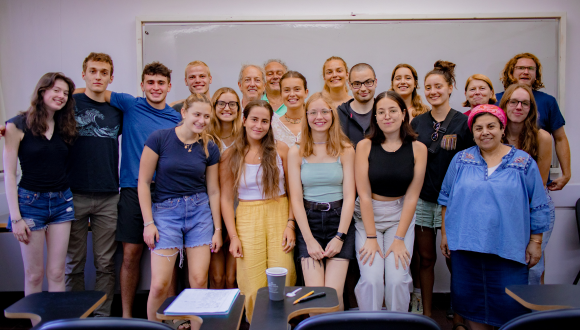
Hebrew class at TAU
Learn more about Hebrew course curriculum and dates
Hack Hebrew: Tips for Language Mastery
 Practice Speaking:
Practice Speaking:
Regular conversation practice is crucial. Join language exchange groups, participate in classes, and try to use Hebrew in daily interactions to build confidence and fluency. During intensive Hebrew language courses at TAU, students are invited to join one of the social activities that might include a visit to a museum, a restaurant outing, or volunteering—at a soup kitchen, for example.
 Do Study Grammar:
Do Study Grammar:
Instead of memorizing individual words, focus on understanding the grammar principles, beginning with verb conjugation — “this is what speaking is impossible without,” says Rashin.
 Use Mnemonics for Spelling:
Use Mnemonics for Spelling:
Creating mnemonics—such as crossing your hands for the letter 'ayin' (ע), for example—can help remember the correct spelling of words that sound similar.
 Engage with Hebrew Content:
Engage with Hebrew Content:
Singing Hebrew songs, watching YouTube videos, and following podcasts can improve your pronunciation and comprehension. If you are already at a more advanced level, try reading short stories by Etgar Keret, or watching Israeli series on Netflix – Shtisel is a good option to start with.
 Be Aware of the Differences between Colloquial and Formal Language
Be Aware of the Differences between Colloquial and Formal Language
Understanding the gap between literary and spoken Hebrew is essential. “Not everything heard in the street belongs in the literary language as even native speakers make mistakes,” says Rashin. At the same time, while most of the coursework focuses on the formal register, several lessons are devoted to slang and its changes over time.
Excitement of Learning Hebrew
Anne Wagner from Germany, currently in Security and Diplomacy MA, started learning Hebrew at TAU in October and continued in the next semester. She says, "Hebrew has relatively easy grammar, but it was challenging to learn so many new words that were completely foreign to me.”
“What helped me memorize Hebrew words was finding links to languages that are familiar to me, particularly my mother tongue, German.”—Anne Wagner
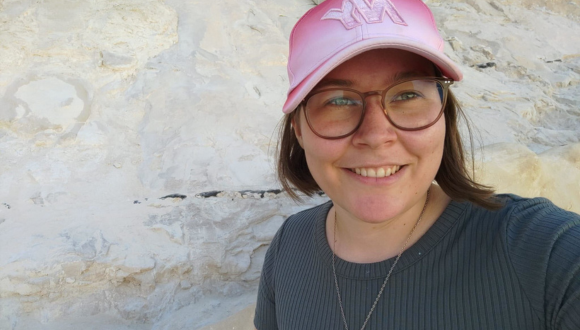
Anne Wagner, Hebrew Ulpan student
“The Hebrew language has a lot of loanwords from Yiddish, which is a language closely related to German. Coincidentally, those words are often my favorite ones because of the beautiful sound that Yiddish words have. Among them is 'שלימזל' (shlimazl), meaning 'unlucky person' in Hebrew and 'a troublesome situation' in German."
"Learning Hebrew in Israel means immediately seeing your progress in your life."—Anne Wagner
“The excitement of being able to have small conversations with Israelis while applying vocabulary you just learned in class, or being able to understand for the first time some words in Israeli news, is something that gives me a huge motivation boost to continue my studies," Anne concludes.
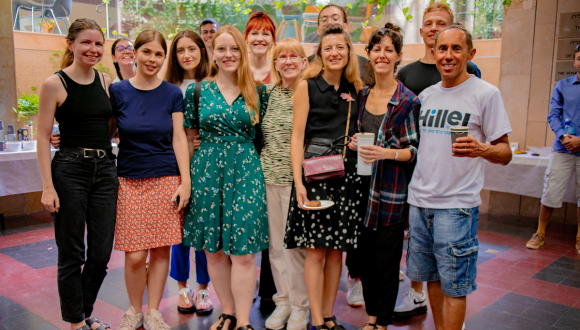
Hanna Rashin (center) with her Hebrew Ulpan group
Isamu Goiati, studying in the International MA in Environmental Studies, from Amsterdam, the Netherlands, decided to learn Hebrew at the university for several reasons: "I wanted to speak Hebrew with my grandpa and make my frequent visits to Israel more enriching by understanding the language.
"I wanted to challenge myself as I am not typically a language person."—Isamu Goiati
“Hebrew is very different from my native language, Dutch. The sentence structure, verb, and noun changes are distinct. However, both languages share the 'ch' sound, making pronunciation easier for me.”

Isamu Goiati with his grandpa
"My favorite word in Hebrew is 'baduk' (בדוק), used similarly to 'word' in U.S. slang, meaning something is certified. Interestingly, there are several words in Dutch that are similar to Hebrew, stemming from Yiddish. For example, 'tof' means the same in both languages, and in Amsterdam, slang terms like 'gabber' (from 'chaver') and 'mokum' (from 'makom') are used," Isamu explains.
"I really enjoyed learning Hebrew at the university. I started with almost no knowledge, and after two courses, I can have decent conversations.”—Isamu Goiati
"Learning the alphabet was surprisingly quick, and it’s nice to be able to speak some Hebrew with my friends and family now!" Isamu concludes.
Learn more about Hebrew course curriculum and dates
Explore TAKA Academic Hebrew program at TAU

